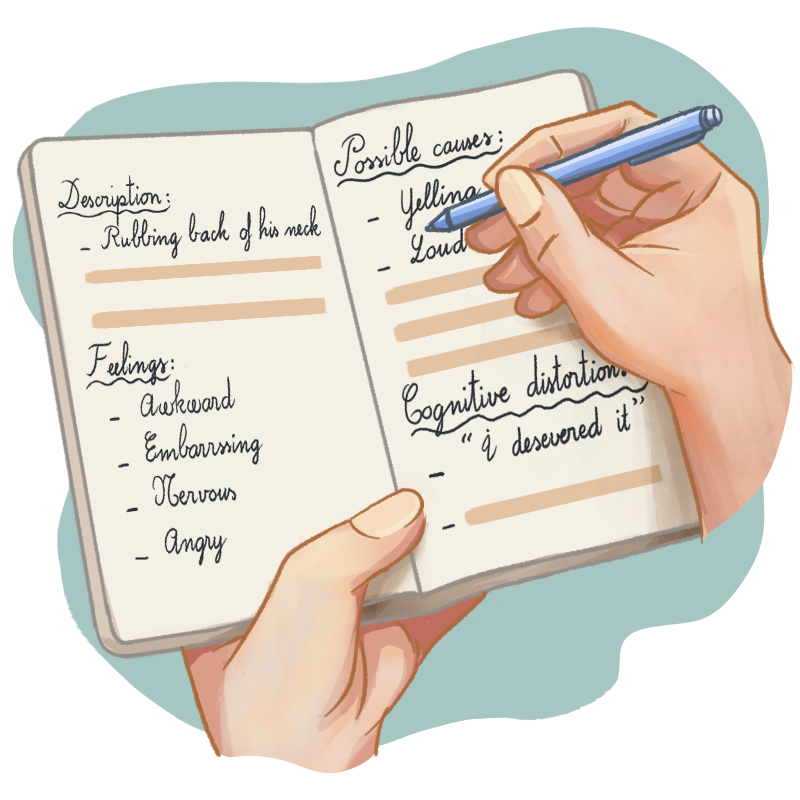





Chapter 4. Clarifying Information from Chronic Traumatic History Copy

Brian is nestled comfortably into the couch. You sit in the chair across from him with your notepad and pencil ready. You smile broadly and begin, “Today we’re gonna continue talking about your story. I’ll ask you some questions and we’ll pin down some of your feelings, thoughts, and possible cues. Once again I’ll be taking notes so later we can check if I got everything accurately.”
“All right.”
“All right,” you smile. “Last time we talked about when you lived in the country and your mom worked at the gas station and pub, and she would drink a lot.”
“Yeah,” Brian mutters dejectedly.
Very simply, you ask, “How would you feel when you saw her come home drunk?”
Brian begins rubbing the back of his neck. He takes a big breath and states, “I was worried, I felt lonely. It wasn’t a nice experience, when she was drunk—she would be upset, and lock herself in her room. I never knew what to do.”
You write quickly, but without looking rushed. “She would be upset,” you repeat, “—how do you mean? What would she do?”
“She would yell, and smash objects. She’d be upset with me too.”
“She would throw objects at you?” you clarify.
“Yeah! At me, and just around…” Brian rolls his eyes off to the side and shrugs.
“What would you think during that?”
“I was scared.”
“I can imagine so,” you say as you cross your legs and lean forward. “Scared is how you would feel. What kind of thoughts did you have running through your mind?”
Brian sways forward and back in his seat. “That she didn’t love me. That she would hurt me…or herself. That she would die, and I’d be alone.” Brian’s last statement is barely above a whisper.
You stop taking notes and find Brian’s eyes with yours. “That is a lot of thoughts. I am wondering if you still believe some of them now—do you still feel like your mom doesn’t love you?”
His head and shoulders droop. “Yeah,” he says under his breath.
“Are you still worried that something might happen to her?”
“Yes.” He gasps. “I think about that every single day and night.”
“When you think about that, what is it that you think might happen?” you ask gently.
“I dunno!” he exclaims. “She could die at any moment. Lots of people die because they drink and take drugs.”
“What do you do when you get those worries?”
“Hmm.” Brian uses his thumbs to crack each of the knuckles on both his hands. “Sometimes, I smash stuff—it makes me feel better.”
“So, you smash objects. Is that something you would do when mom would yell?”
“Yeah, sometimes. But more once I moved to grandma’s.” He looks a little embarrassed as he continues, “It provides some relief. But it really upsets grandma.”
“What does she do?”
“Ugh, she yells at me, which upsets me even more. And we get into an argument. She’s threatened to call the police…”
“How does that make you feel?”
He pauses for a moment. “…Like I’m like my mom.”
”Do you think you are? You believe that?”
“Yeah.” He rushes to clarify, “But I don’t drink or take drugs.”
You keep digging, “In what ways do you think you’re like your mom?”
“I smash objects and I hurt other people’s feelings.”
“Do you ever worry grandma would actually give you away?”
Brian scrunches both his eyebrows in concern. “Yeah,” he growls softly, his voice catching in his throat.
“OK,” you accept. “What usually happens with her after you argue?”
He purses his lips. “It depends. Sometimes I go…walk around and come home after she’s asleep. Or go to my room and listen to music.” He crinkles his nose, a little embarrassed. “I listen to music, but it’s not enough.”
